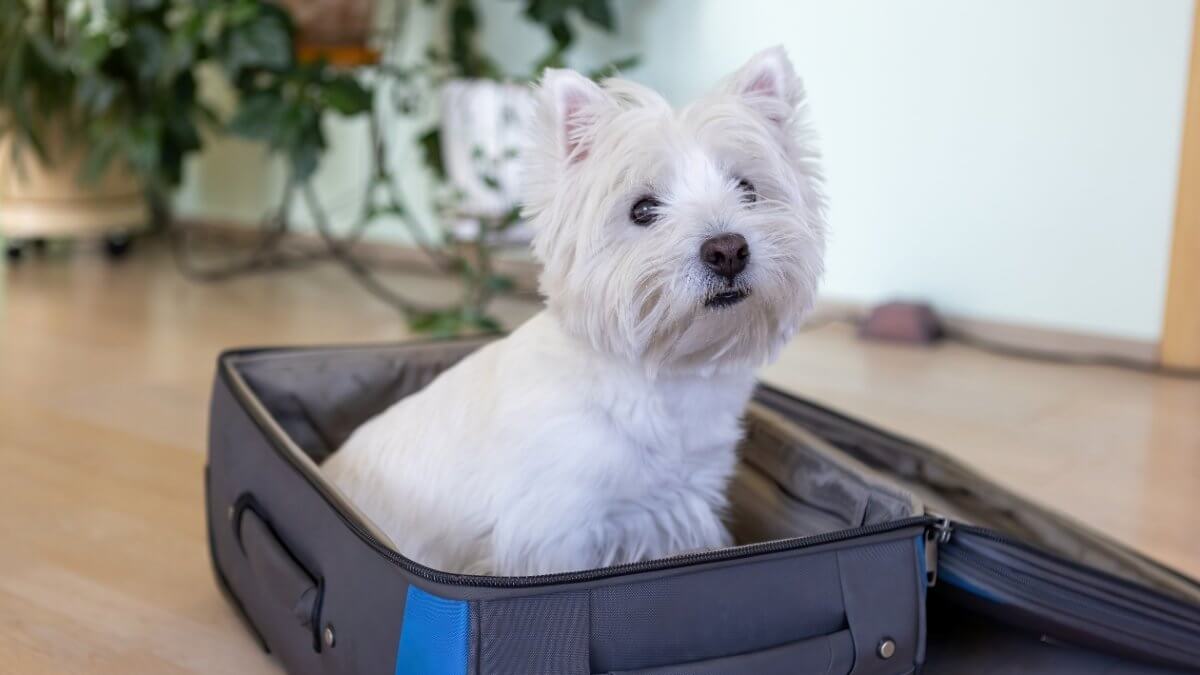


Home » New Dog Import Rules Are In Effect: Updates, Revisions, and What You Need to Know

This month, rules for bringing a dog into the United States are changing. As of August 1, people may no longer bring dogs under six months of age into the US. And people bringing in dogs over six months of age will be required to fill out new import forms.
In July 2023, the United States Centers for Disease Control and Prevention (CDC) proposed new rules to address the public health risk of dog-maintained rabies virus variant (aka, canine rabies) associated with the importation of dogs into the US. In addition to issuing multiple calls to action for all dog owners, the American Kennel Club (AKC) submitted a formal comment in September 2023 to CDC, urging it to retain its policy allowing personally-owned dogs that have not spent time in countries classified as high-risk or restricted for canine rabies to be imported into the US younger than six months of age if they met health and vaccination requirements.
In May of this year, a final rule was published in the Federal Register . Since then, many concerned purebred dog owners, enthusiasts, and sportsmen, along with airlines and groups that import rescue dogs from foreign countries, have expressed deep concerns with the impact the new rules will have. Other groups, including retail rescue groups and the Sportsmens Alliance, have threatened, or are planning, to file suit. As a result of extensive feedback and concerns, the CDC announced revisions in late July to certain requirements and enforcement practices in the rule.
On July 22, the CDC announced that “to provide greater flexibility to the requirements for dogs coming from canine rabies-free or low-risk countries, dogs that have spent the prior six months only in canine rabies-free or low-risk countries will be able to enter the US with a CDC Dog Import Form online submission receipt as acceptable documentation.”
This form can be filled out the day of travel, and the receipt can be shown to airlines and border officials on a smart phone or with a printed copy. For these dogs, the receipt will be good for travel into the US for six months from the date of issuance, including multiple entries into the US. However, all dogs entering the US must still have a microchip and be over six months of age.
In a recent discussion with AKC staff, CDC staff clarified that for dogs that have not been in a canine rabies high-risk country in the six months prior to importation, the CDC Dog Import Form does not require the importer to provide a photo of the dog or its microchip number. However, both CDC and AKC recommend that importers of these dogs travel with a digital or printed copy of their dog’s vaccination record, a photo of their dog, and a record of the dog’s microchip number as a precautionary measure. It should be noted that some US states may also require this or similar information.
For dogs that spent any time in a country classified as high-risk for canine rabies in the six months before entering the US, additional documents and requirements remain in effect. For these dogs, the CDC Dog Import Form will require the dog’s microchip number and photo.
All dogs being imported into the US must:
Additional requirements may be required by CDC, depending on the type of importation, for:
For dogs arriving in the US by air and that have traveled in-cabin, airlines are now required to generate air waybills. This requirement is the same as has been required of dogs arriving in the US by air but that were flown as cargo. Airlines unable to generate an air waybill for in-cabin dogs due to the time required for technology updates may obtain a temporary waiver by providing the same data to CDC in another format. Anyone travelling with a dog who intends to arrive in the US by air is strongly encouraged to contact their airline to determine and meet the requirements prior to arriving at an airport for travel.
CDC staff continues to emphasize that the latest information available to importers is available on its website at: www.cdc.gov/dogtravel.
CDC staff also noted that the first nine months of implementation of the new dog importation rules will be an “adaptation” period, during which it will be looking at additional information and program performance to determine reasonableness, feasibility, and potential rule changes.
AKC recognizes the serious health threats posed by the recent, continuing import of unhealthy dogs using fraudulent veterinary/import paperwork, and supports CDC’s intention of protecting the public from serious health risks. However, AKC remains concerned that banning the import of all dogs younger than six months is overly burdensome and will have a disproportionate impact on the entry/importation of low-risk, personally-owned dogs, including those that regularly cross the US-Canadian border for canine events, training, veterinary care, and breeder collaboration.
If you have concerns about the new import rule, contact your members of the U.S. House and Senate, and the CDC. Respectfully express your concerns. It is recommended that breed enthusiasts who import personally-owned dogs from canine rabies-free or low-risk countries, or owners who routinely cross a land border with their dog, ask Congress and CDC to eliminate the disproportionate impact that they experience, particularly regarding the requirement that puppies be six months of age for importation.
First, go to: www.cdc.gov/dogtravel for the latest information on CDC’s dog importation requirements.
Then, for specific inquiries or to express concerns, contact CDC at: (404) 498-1600 or cdcanimalimports@cdc.gov.